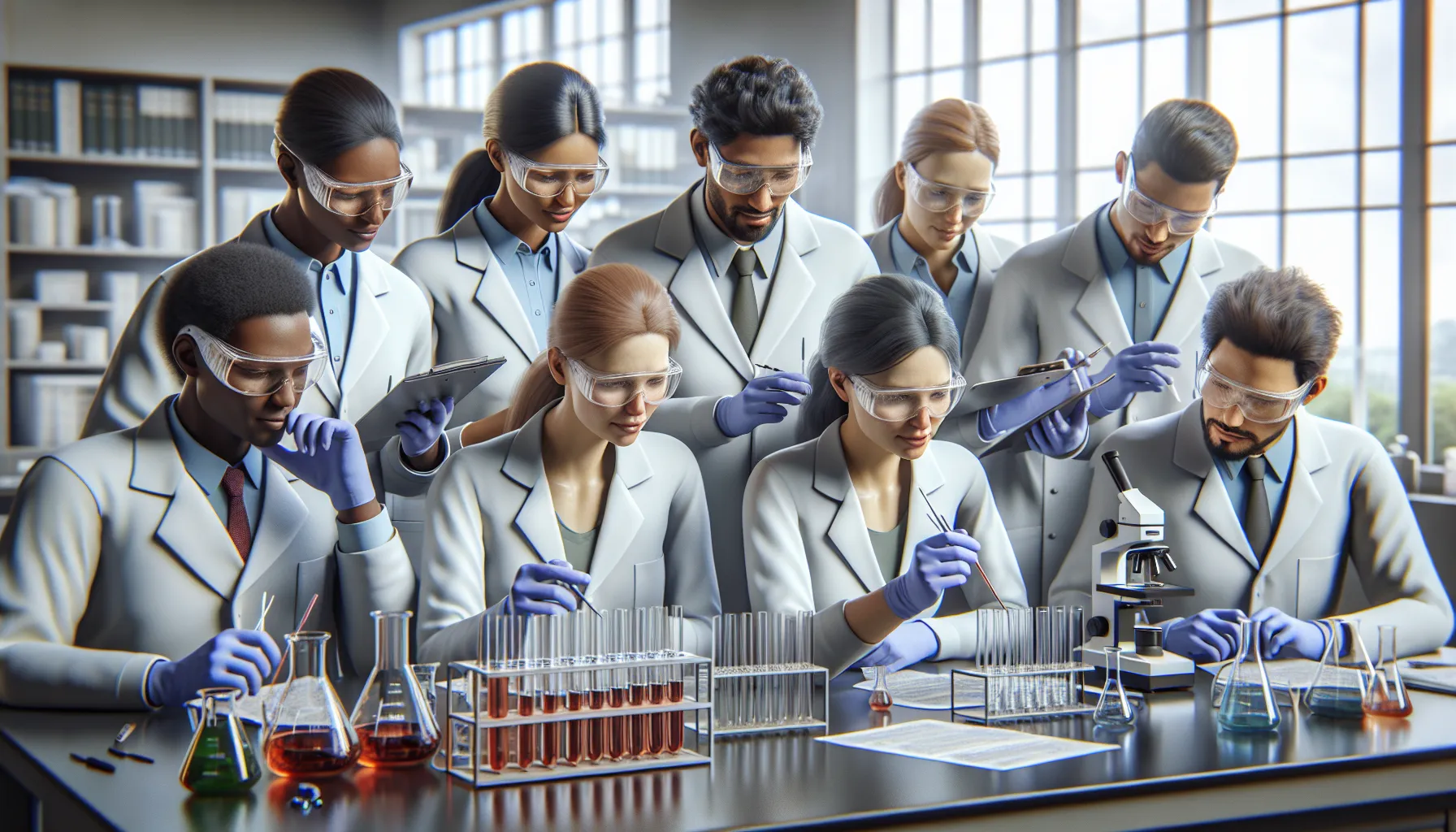Key Takeaways
- Science aims to uncover truths about the natural world and deepen our understanding of how everything functions.
- The primary goals of science include exploring natural phenomena, advancing knowledge, solving problems, and improving life.
- Scientific inquiry relies on systematic methods, including observation, experimentation, hypothesis testing, and theory development.
- Science plays a pivotal role in society by driving innovation, enhancing quality of life, and addressing global challenges such as climate change and public health crises.
- Ethical considerations ensure scientific progress aligns with societal values, prioritizing honesty, safety, and equitable access to advancements.
- Future scientific goals focus on sustainability, health innovation, space exploration, AI integration, and decoding complex areas like the human brain.
Science has always fascinated me. It’s this incredible tool we use to explore and understand the world around us, from the tiniest particles to the vastness of the universe. But have you ever stopped to think about what science is really aiming for? Is it just about discovering new things, or is there something deeper driving it?
At its core, science is about curiosity and problem-solving. It’s not just about answering questions—it’s about asking the right ones. Whether it’s finding cures for diseases, uncovering the secrets of nature, or making life better with technology, science is all about pushing boundaries and improving our understanding of how everything works. It’s like a never-ending quest for knowledge, and honestly, that’s what makes it so exciting.
Understanding The Concept Of Science
Science is a systematic approach to studying and understanding the natural world. It relies on observation, experimentation, and evidence to uncover truths about how things work. By examining patterns and testing hypotheses, science seeks to explain phenomena that shape our lives.
At its core, science involves curiosity and critical thinking. Researchers identify problems or ask questions, then use logical methods to explore potential solutions. For example, studying ecosystems reveals relationships between species, while medical research identifies effective treatments for illnesses.
Science also evolves with new discoveries. Each breakthrough builds on previous findings, creating a foundation for further exploration. Advances in fields like physics, biology, and chemistry demonstrate how interconnected scientific endeavors are, highlighting their shared goal of expanding human knowledge.
The Primary Goal Of Science

Science’s main focus lies in uncovering truths about our world. It aims to explain how things function, bridging the gap between curiosity and understanding.
Exploring Natural Phenomena
Understanding the natural world is central to science. Researchers observe patterns, test hypotheses, and uncover relationships in areas like ecology, physics, and geology. For example, studying weather systems reveals how atmospheric phenomena lead to storms and climate shifts. Exploration like this provides insights that shape our interaction with the environment.
Advancing Knowledge And Understanding
Science expands collective knowledge by delving into unanswered questions. Critical analysis and experimentation help scientists refine or challenge existing theories. In medicine, for instance, research on genetics has deepened understanding of diseases, enabling tailored treatments. Each discovery builds on the existing framework, fostering a continuous cycle of learning and innovation.
The Role Of Science In Society

Science plays a critical role in shaping our lives and addressing the complexities of the modern world. Its contributions span from improving individual well-being to tackling large-scale global issues.
Improving Human Life
Scientific advancements continually enhance quality of life by driving innovation in healthcare, technology, and education. In medicine, breakthroughs like vaccines, surgical techniques, and personalized therapies have increased life expectancy and reduced mortality rates. For instance, mRNA vaccines, developed using decades of molecular biology research, have rapidly addressed pandemics such as COVID-19. In technology, developments like renewable energy sources and AI applications simplify daily routines, creating safer and more sustainable living conditions.
Education benefits from science as well, with interactive tools like virtual labs and e-learning platforms expanding access to knowledge. When science fosters innovation, it equips people with resources to lead healthier, safer, and more informed lives.
Addressing Global Challenges
Science offers solutions to urgent global problems, such as climate change, resource shortages, and public health crises. By studying Earth systems, researchers develop strategies to combat global warming and protect biodiversity. For example, advances in renewable energy, such as wind turbines and solar panels, reduce dependency on fossil fuels, mitigating greenhouse gas emissions.
In public health, science addresses pandemics by improving disease surveillance and response mechanisms. Collaborative efforts in virology and immunology enable the development of global vaccination programs. Additionally, scientific research in agriculture tackles food insecurity through techniques like genetic modification and sustainable farming practices. By providing data-driven solutions, science empowers societies to adapt and thrive in a rapidly changing world.
The Methods Used In Scientific Inquiry

Scientific inquiry relies on structured methods to uncover truths and expand understanding. These methods ensure reliable results by focusing on systematic observation and evidence-based reasoning.
Observation And Experimentation
I focus on observing phenomena to gather initial data for investigation. Observation helps identify patterns and anomalies in the natural world, such as tracking animal behaviors or studying planetary motions. After observations, I design experiments to test specific variables in controlled settings. For example, I might manipulate temperature in a lab to study its effect on chemical reactions. Repeated experiments provide consistent results, strengthening the reliability of findings.
Formulating Theories And Hypotheses
I develop hypotheses to explain observations and guide further study. Hypotheses predict potential outcomes, offering testable statements like “Increased sunlight boosts plant growth.” Testing these predictions validates or refines the hypothesis. Once substantial data supports a hypothesis, I help frame broader theories, like evolution or gravity, that explain complex phenomena. These theories remain open to revision if new evidence emerges, keeping scientific inquiry adaptable and progressive.
Ethical Considerations In Science
Ethical principles guide scientific research to ensure integrity and societal benefit. Researchers prioritize honesty in data reporting, accurately representing findings without fabrication or manipulation. For example, peer-reviewed journals require transparency in methodology and results to uphold credibility.
Respect for human and animal rights is central to ethical science. Researchers obtain informed consent for human participation in studies, ensuring volunteers fully understand the purpose, risks, and potential benefits. In animal research, institutions enforce strict guidelines to minimize harm, such as protocols under the Institutional Animal Care and Use Committees (IACUC).
Fair access to scientific advancements is another ethical focus. Scientists aim to ensure that everyone, regardless of geographical or economic background, benefits from innovations like vaccines or sustainable technology. For instance, global health initiatives distribute life-saving treatments to underserved regions.
Balancing progress with potential risks safeguards against harm. Environmental scientists assess the impact of new technologies on ecosystems before implementation, while genetic researchers consider privacy and ethical dilemmas related to gene editing. These measures ensure advancements align with societal needs without unintended negative consequences.
The Future Of Scientific Goals
Scientific goals are evolving, shaped by emerging challenges and advancements in technology. I see future scientific pursuits focusing on sustainability, health innovation, and exploring uncharted territories. Addressing these areas ensures science remains relevant and impactful for generations.
- Advancing Sustainability
Mitigating climate change and developing green technologies are critical. Research into renewable energy, efficient carbon-capture methods, and sustainable agriculture is accelerating. Innovations like seawater desalination and biodegradable materials highlight how science can promote global environmental health.
- Revolutionizing Healthcare
Customized medicine and AI-driven diagnostics are redefining medical research. I believe breakthroughs in disease prevention, genome editing, and mental health treatments will dominate future goals. Projects such as universal vaccines and combating antimicrobial resistance exemplify this trend.
- Expanding Space Exploration
Advances in space research aim to uncover life-supporting conditions beyond Earth. Collating data from Mars missions, exploring moons like Europa, and developing sustainable off-Earth habitats are key aspirations. These efforts ensure humanity remains prepared for future cosmic challenges.
- Enhancing Artificial Intelligence
Integrating AI with ethical safeguards will better decision-making processes across industries. From automating experiments to refining machine learning models for complex issues like weather prediction, AI’s capabilities enhance the scope of scientific inquiry.
- Decoding the Brain
Brain science explores consciousness, memory, and neurological conditions. Understanding cognitive functions and applying findings to artificial intelligence or medical fields are priorities for advancing this domain.
Future scientific goals address global needs while fostering innovation and collaboration.
Conclusion
Science is more than a method; it’s a journey fueled by curiosity and the desire to understand the world around us. It connects us to the mysteries of nature, drives innovation, and helps us tackle some of the biggest challenges we face as a society.
What excites me most is how science continues to evolve, opening doors to possibilities we can’t even imagine yet. It’s a never-ending quest for knowledge that not only deepens our understanding but also shapes the future in ways that benefit everyone.
Frequently Asked Questions
What is the main purpose of science according to the article?
The main purpose of science is to uncover truths about the world, understand how things function, and bridge the gap between curiosity and knowledge through observation, experimentation, and evidence-based inquiry.
How does science contribute to addressing global challenges?
Science plays a key role in solving global issues like climate change, resource shortages, and public health crises by providing data-driven solutions and innovations such as renewable energy and vaccines.
Why is curiosity important in scientific inquiry?
Curiosity drives researchers to ask meaningful questions, identify problems, and explore solutions, forming the foundation of scientific discovery and innovation.
What methods are used in scientific research to ensure reliable results?
Scientific research relies on systematic observation, pattern recognition, hypothesis testing, experimentation, and evidence-based reasoning to produce accurate and reliable results.
How do scientific advancements build on previous discoveries?
Each discovery builds on existing knowledge by expanding understanding, connecting different scientific fields, and fostering continuous innovation through collaboration and new research.
What ethical considerations are important in scientific research?
Ethical considerations include honesty in data reporting, transparency, fair access to advancements, respect for human and animal rights, informed consent, and balancing progress with potential risks.
How does science improve quality of life?
Science enhances quality of life through medical breakthroughs, technological advancements, and solutions for global challenges, such as mRNA vaccines, AI, and renewable energy.
What role does science play in future innovation?
Science drives future innovation by focusing on sustainability, health advancements, space exploration, artificial intelligence, and brain science, addressing global needs through collaborative efforts.
Why is it important to test hypotheses in science?
Hypothesis testing allows researchers to predict outcomes, verify claims through experimentation, and refine or develop theories to better explain phenomena.
How can science promote societal benefits while mitigating risks?
Science promotes societal benefits by adhering to ethical standards, ensuring fair access to advancements, and minimizing risks through careful impact assessments and responsible practices.

